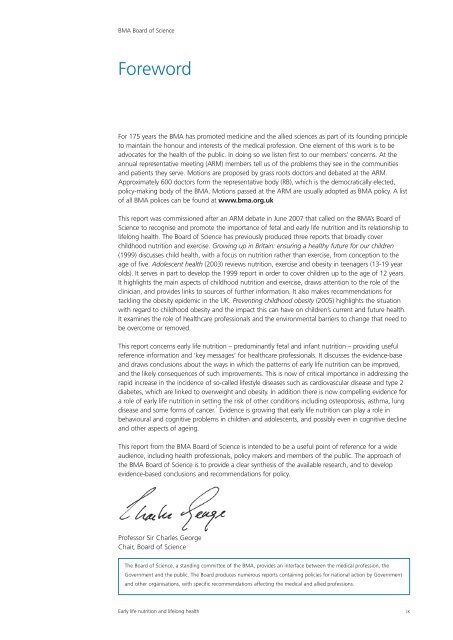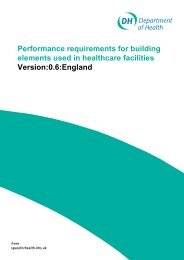Early Life Nutrition and Lifelong Health - Derbyshire Local Medical ...
Early Life Nutrition and Lifelong Health - Derbyshire Local Medical ...
Early Life Nutrition and Lifelong Health - Derbyshire Local Medical ...
Create successful ePaper yourself
Turn your PDF publications into a flip-book with our unique Google optimized e-Paper software.
BMA Board of ScienceForewordFor 175 years the BMA has promoted medicine <strong>and</strong> the allied sciences as part of its founding principleto maintain the honour <strong>and</strong> interests of the medical profession. One element of this work is to beadvocates for the health of the public. In doing so we listen first to our members’ concerns. At theannual representative meeting (ARM) members tell us of the problems they see in the communities<strong>and</strong> patients they serve. Motions are proposed by grass roots doctors <strong>and</strong> debated at the ARM.Approximately 600 doctors form the representative body (RB), which is the democratically elected,policy-making body of the BMA. Motions passed at the ARM are usually adopted as BMA policy. A listof all BMA polices can be found at www.bma.org.ukThis report was commissioned after an ARM debate in June 2007 that called on the BMA’s Board ofScience to recognise <strong>and</strong> promote the importance of fetal <strong>and</strong> early life nutrition <strong>and</strong> its relationship tolifelong health. The Board of Science has previously produced three reports that broadly coverchildhood nutrition <strong>and</strong> exercise. Growing up in Britain: ensuring a healthy future for our children(1999) discusses child health, with a focus on nutrition rather than exercise, from conception to theage of five. Adolescent health (2003) reviews nutrition, exercise <strong>and</strong> obesity in teenagers (13-19 yearolds). It serves in part to develop the 1999 report in order to cover children up to the age of 12 years.It highlights the main aspects of childhood nutrition <strong>and</strong> exercise, draws attention to the role of theclinician, <strong>and</strong> provides links to sources of further information. It also makes recommendations fortackling the obesity epidemic in the UK. Preventing childhood obesity (2005) highlights the situationwith regard to childhood obesity <strong>and</strong> the impact this can have on children’s current <strong>and</strong> future health.It examines the role of healthcare professionals <strong>and</strong> the environmental barriers to change that need tobe overcome or removed.This report concerns early life nutrition – predominantly fetal <strong>and</strong> infant nutrition – providing usefulreference information <strong>and</strong> ‘key messages’ for healthcare professionals. It discusses the evidence-base<strong>and</strong> draws conclusions about the ways in which the patterns of early life nutrition can be improved,<strong>and</strong> the likely consequences of such improvements. This is now of critical importance in addressing therapid increase in the incidence of so-called lifestyle diseases such as cardiovascular disease <strong>and</strong> type 2diabetes, which are linked to overweight <strong>and</strong> obesity. In addition there is now compelling evidence fora role of early life nutrition in setting the risk of other conditions including osteoporosis, asthma, lungdisease <strong>and</strong> some forms of cancer. 1 Evidence is growing that early life nutrition can play a role inbehavioural <strong>and</strong> cognitive problems in children <strong>and</strong> adolescents, <strong>and</strong> possibly even in cognitive decline<strong>and</strong> other aspects of ageing.This report from the BMA Board of Science is intended to be a useful point of reference for a wideaudience, including health professionals, policy makers <strong>and</strong> members of the public. The approach ofthe BMA Board of Science is to provide a clear synthesis of the available research, <strong>and</strong> to developevidence-based conclusions <strong>and</strong> recommendations for policy.Professor Sir Charles GeorgeChair, Board of ScienceThe Board of Science, a st<strong>and</strong>ing committee of the BMA, provides an interface between the medical profession, theGovernment <strong>and</strong> the public. The Board produces numerous reports containing policies for national action by Government<strong>and</strong> other organisations, with specific recommendations affecting the medical <strong>and</strong> allied professions.<strong>Early</strong> life nutrition <strong>and</strong> lifelong healthix



